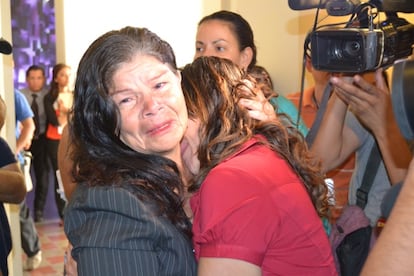Mother and daughter separated in Salvadoran civil war are reunited
Human rights organization ProBúsqueda is trying to locate missing children taken by military

Unable to contain her tears, a Salvadoran mother on Tuesday hugged her daughter for the first time in 29 years after she believed she had lost her for good during the brutal civil war that terrorized El Salvador between 1980 and 1992.
It was an emotional and dramatic moment for Josefina Osorio and her now 31-year-old daughter, Xiomara Patricia.
“When the police took her from my arms, she was barely two years old,” Osorio recalled. She doesn’t remember the exact date or month, but knows that it occurred in 1984 when the army conducted a counter-insurgency operation in Cerros de San Pedro, San Vicente province in central El Salvador. The war was then at its height. The mountainous areas and rural cities harbored the Farabundo Martí National Liberation Front (FMLN) guerrilla insurgency. The army was trying to flush out the rebel fighters by conducting murderous raids on rural communities.
The Osorio family was captured and taken to a local police station where an officer snatched Josefina’s baby from her arms. “They are going to kill you so give me the girl and I will save her,” Osorio recalls the officer telling her. Years later, Osorio told her story to ProBúsqueda (Pro Search), a humanitarian organization that tries to reunite parents with children who were taken during the civil war.
“The police officer took the baby home because his wife supposedly could not have children,” said ProBúsqueda lead investigator Margarita Zamora. “They decided to keep her but some months later the wife becomes pregnant and the girl was given to another woman who became her adopted mother. She was baptized and legally registered as Carolina Cárcomo.”
In an interview with EL PAÍS, Xiomara Patricia said she “had a normal childhood” with her adopted mother, who died four years ago. “Now I am married and I have three children that I take care of. War is something that should never again occur in El Salvador,” she said.
Xiomara Patricia tearfully said that she is going to try to “make up for the time lost” between herself and her real mother. “Thank God we are able to do it.”
Founded in 1993 by the late Spanish-born Jesuit priest Jon Cortina, ProBúsqueda took DNA samples from Xiomara Patricia’s biological siblings and matched them with her DNA. Mother and daughter had been looking for each other for many years until just some weeks ago the DNA match was confirmed by the Human Rights Center at Berkeley University in California.
“Both of them look so much alike, physically. DNA matching and physical appearances are fundamental elements in the investigations,” Zamora said.
ProBúsqueda currently has some 500 other investigations underway. Of the 389 cases solved, 239 children have already been reunited with their real parents.
“We need the military to cooperate with us in locating those missing children,” Zamora said. “They have records which they have refused to share with us because of the amnesty laws which offer them impunity.”
Two weeks ago, three unidentified armed men burned the offices of ProBúsqueda in San Salvador. Some files and furniture were destroyed, but the information in the organization’s databanks survived. Police are still investigating the incident.
The 12-year armed conflict in El Salvador claimed some 75,000 lives, most of whom were civilians. Another 8,000 people disappeared and one million sought refuge in other countries.
Tu suscripción se está usando en otro dispositivo
¿Quieres añadir otro usuario a tu suscripción?
Si continúas leyendo en este dispositivo, no se podrá leer en el otro.
FlechaTu suscripción se está usando en otro dispositivo y solo puedes acceder a EL PAÍS desde un dispositivo a la vez.
Si quieres compartir tu cuenta, cambia tu suscripción a la modalidad Premium, así podrás añadir otro usuario. Cada uno accederá con su propia cuenta de email, lo que os permitirá personalizar vuestra experiencia en EL PAÍS.
¿Tienes una suscripción de empresa? Accede aquí para contratar más cuentas.
En el caso de no saber quién está usando tu cuenta, te recomendamos cambiar tu contraseña aquí.
Si decides continuar compartiendo tu cuenta, este mensaje se mostrará en tu dispositivo y en el de la otra persona que está usando tu cuenta de forma indefinida, afectando a tu experiencia de lectura. Puedes consultar aquí los términos y condiciones de la suscripción digital.








































